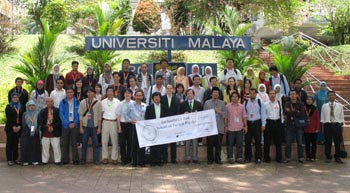The First Particle Physics School in South East Asia held in Malaysia
 |
The first Particle Physics School was held at the University of Malaya, Kuala Lumpur, from March 14 to 18. Forty-eight students from four different countries (30 from Malaysia, 8 from Indonesia, 6 from Vietnam, and 4 from Thailand) attended the inaugural school.
The host institutes of this year's school were the University of Malaya, the Malaysian Nuclear Agency, and the High Energy Accelerator Research Organization, KEK, Japan.
This school, launched by KEK Japan, is an educational program for young students who have the potential to become researchers in South East Asia. The program targets young physicists who are preparing for their PhD degrees in high-energy physics, or engaged in post-doctoral work. This school represents the initial step towards establishing strong ties between Asian countries through research collaboration in the areas of high energy physics and accelerator physics.
The purpose of this school is to give the region's top students a chance to study experimental particle physics in collaboration with people from different cultures and backgrounds. Another objective of the school is to give young physicists an introduction to the theoretical aspects of recent advances in elementary particle physics.
The program consisted of four lectures and one experiment presented by five lecturers. The lecture topics were theoretical particle physics, experimental particle physics, accelerator theory, and particle detector technology. The experiment involved the construction and use of a particle detector.
In the particle detector experiment, students made a wire chamber, which is a detector for particles of ionizing radiation, and identified beta-rays and gamma-rays by using the checking sources. Whenever a signal came out, students gave a cheer. The classes were filled with youthful energy.
In every class, participants were eager to express their opinions and ask questions. At the breaks, a lot of students went up to the lecturers to ask questions individually. Participants discussed career paths until 10pm in a cozy atmosphere during the informal session with volunteer lecturers and students.
“We gained the impression that South East Asian students had the motivation to undertake a serious study of basic science. The first Particle Physics School in South East Asia proved to be a fruitful gathering and concluded successfully. We believe that schools of this kind are useful for the development of particle physics in our region, South East Asia,” said Takeo Higuchi, Assistant professor at KEK and a member of the school’s organizing committee.
